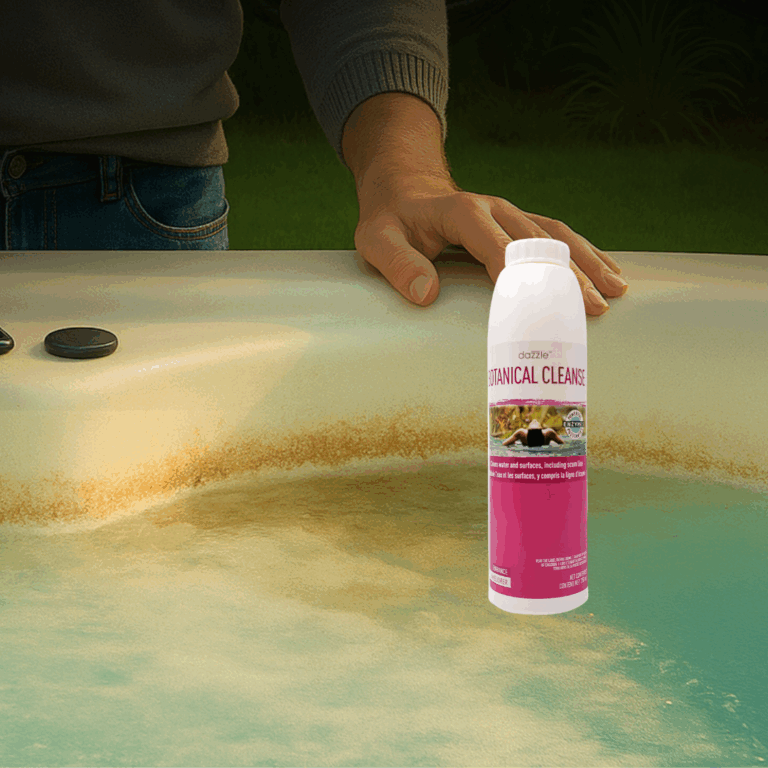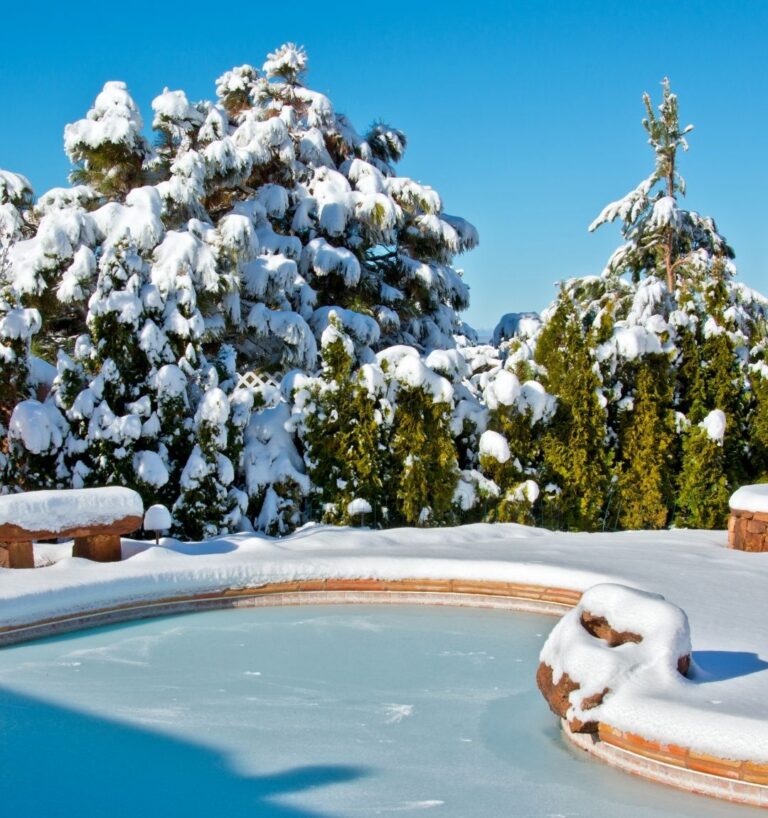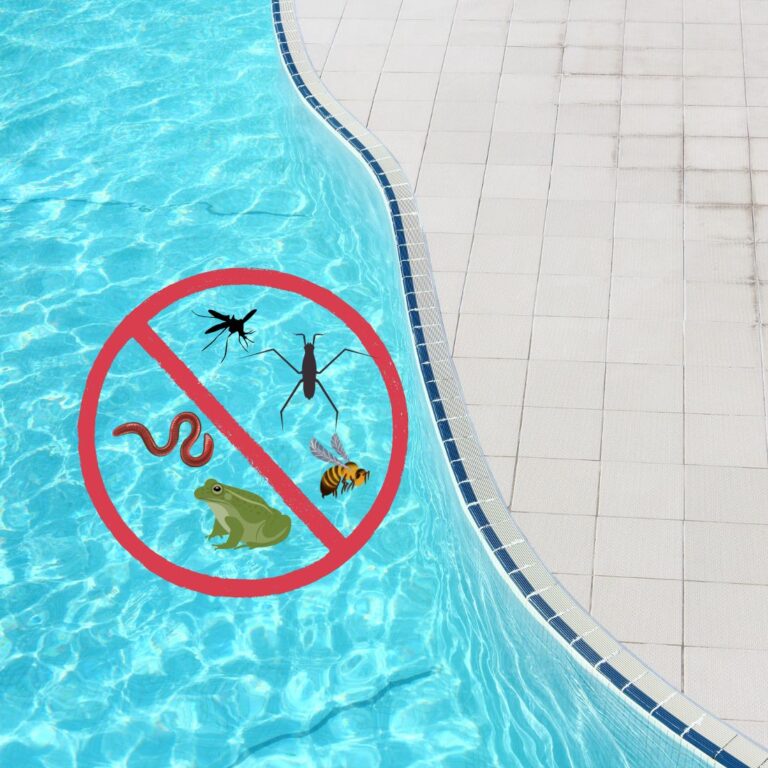If you’re fed up with mosquitoes, ducks, bees, worms, and frogs making themselves at home in your pool, we’ve got some easy solutions to help you keep these uninvited visitors away permanently.
Check out each guide for a detailed walkthrough tailored to the specific type of pool intruder you’re dealing with!
How to Manage Water Striders in Your Pool
Water striders, often called pond skaters or Jesus bugs, are harmless insects that glide gracefully over the surface of pools. They are drawn to pools because they feast on other insects and organic debris that might fall into the water. While not harmful to humans, their presence can be a nuisance.
Here’s some tips to managing your pesky little friends:
Identify the Problem
Water striders are usually small, dark-colored insects that effortlessly skate across the water’s surface. Although they’re harmless, they are attracted to pools as an easy feeding ground.
Remove the Food Source
- Algae Control – Water striders feed on other insects, which may thrive on pool algae. Keeping your pool clean and balanced with the right chemicals reduces algae growth, thereby limiting their food source.
- Skimmer and Filter – Ensure your pool’s skimmer and filter are functioning effectively to remove debris and insects, minimizing the food available for water striders.
Physical Removal
- Skimmer – Use a pool skimmer net to manually remove water striders from the surface of your pool.
- Manual Vacuuming – Conduct a thorough cleaning by manually vacuuming the pool. This helps remove both debris and the insects that might attract water striders.
Pool Maintenance
- Water Chemistry – Keep your pool’s pH and chlorine levels properly balanced to prevent algae growth and other conditions that could attract water striders.
- Shock Treatment – If you’re dealing with a significant algae problem, consider shocking your pool. This process kills algae and other insects, further reducing available food sources for water striders.
- Cover the Pool – When not in use, cover your pool to prevent insects from entering and finding sustenance.
By cutting off the root cause—namely, the food source—and applying these removal techniques, you can effectively manage the presence of water striders in your pool, ensuring a more enjoyable swimming experience.
🦟 Strategies for Keeping Mosquitoes Out of Your Pool
Mosquitoes are more than just annoying pests that make you look frantic as you swat them away. They are carriers of serious diseases like West Nile Virus and Zika Virus. Although only certain species are highly dangerous, it’s impossible to tell which until after a bite occurs.
Since mosquitoes are attracted to water, humidity, and the movement of people, your pool area can become an ideal spot for them. Instead of turning your pool into their feeding ground, take proactive steps to protect your family’s well-being and keep these pesky insects at bay.
Eliminate Standing Water
After it rains, take a stroll around your yard to identify areas where water collects, as these can become breeding grounds for mosquitoes. Mosquitoes can develop from eggs to adults in about two weeks, but the eggs can survive for months, waiting for water to trigger hatching.
- Remove or turn over containers like buckets and old tires.
- Fill in low spots in your yard that retain moisture.
- For items like wading pools and fountains, refresh the water weekly.
- Keep water features like fountains in motion to discourage mosquitoes from laying eggs.
Utilize a Pool Cover
When your pool isn’t in use, covering it can deter mosquitoes, who might see it as an ideal spot to lay eggs. A solar pool cover is particularly beneficial:
- Reduces the pool’s appeal to mosquitoes by covering the surface.
- Helps heat the pool and reduces water evaporation.
- Saves on energy, water, and chemical costs.
Maintain Your Landscaping
Mosquitoes are attracted to moist and overgrown areas. Regular maintenance can help:
- Mow the lawn frequently to avoid grass clippings.
- Remove leaf litter and other organic debris.
- Pay attention to damp areas, such as under decks, to prevent them from becoming breeding sites.
Address Tree Holes
If you have trees with holes, they can collect water and become mosquito nurseries:
- Fill tree holes with expanding foam insulation to prevent water accumulation without harming the tree.
- Confirm the hole holds water before filling, as non-water-holding holes can be habitats for wildlife.
Fix Septic Tank Issues
Mosquitoes can exploit openings in septic tanks to lay eggs:
- Inspect for entry points like uncovered ventilation pipes or cracks.
- Secure ventilation pipes with fine mesh screens.
- Seal cracks in tank walls with cement.
- Consider filling abandoned septic tanks to prevent mosquito colonization.
Maintain Pool Chemistry
A well-maintained pool is inhospitable to mosquitoes:
- Ensure your pool water is clean and chemically balanced.
- Regularly clean the filter and skimmer.
- Stick to a consistent pool maintenance schedule to keep your pool pristine and pest-free.
By implementing these strategies, you can turn your pool area into a mosquito-free zone, ensuring a more enjoyable and safer swimming experience for you and your family.
🦆 Why Do Ducks Like Pools? Here’s Why and How to Politely Persuade Them To Leave
Your pool provides a refuge free from natural predators. There are no lurking alligators or other threats in your backyard pool, making it a safe haven. Ducks can swim, feed, and engage in their usual activities without the fear of becoming someone else’s meal. It’s an idyllic setting for a duck.
You may need to maintain these tactics for several days to convey that your pool isn’t as comfortable and inviting as they initially thought.
Monitor the bird activity closely. Once you notice a decline in duck visits, you can gradually remove the measures you’ve implemented.
Employ a Solar Cover
- Discourage ducks by covering your pool with a solar cover when it’s not in use. This prevents them from landing by creating a barrier
If ducks can’t float around, they’re likely to move on to more accommodating locations.
- Additionally, the cover provides the added benefits of maintaining your pool’s temperature and keeping out debris. It’s a win-win situation!
Use An Automatic Pool Cleaner
- Ducks are naturally skittish and have a strong instinct to avoid predators. A moving, underwater robotic pool cleaner can mimic the movement of a potential threat, helping to deter ducks from your pool.
Leave Inflatable Pool Toys Out
One of the simplest methods to keep ducks away from your pool is to leave inflatable pool toys floating when the pool isn’t in use. Try ones that resemble natural predators. Here are a few creative choices:
- Alligator
- Killer Whale
- Snake
- Bobbing Dolphin
Let Your Dog Do the Work
Dogs can be excellent deterrents for ducks. Their presence and activity in your yard can help keep ducks at bay, as the birds typically avoid areas where potential predators are present. Here’s how your furry friend can assist in duck control:
Important Consideration: While using a dog to deter ducks can be effective, remember that the well-being of your pet should always come first. Barking at ducks to keep them out of your pool isn’t a reason to get a dog. A dog (or any pet) is a long-term commitment that requires love, care, attention, and yes, money for food, toys, and veterinary care. Only get a dog (or any other pet) if you’re prepared to make all of those commitments to another living creature deserving of the best care possible.
🐝 How to Keep Bees Away From a Pool
Bees and wasps can quickly turn a relaxing pool day into a stressful experience with the threat of a painful sting. While they see your pool as an abundant water source, it’s important to remember that these insects play a crucial role in the ecosystem, even in your backyard. Rather than eliminating them, consider guiding them to a more suitable location.
Provide an Alternative Water Source
To divert bees and wasps away from your pool, create a more attractive water source elsewhere:
- Set up a bee bath: Fill a shallow dish or birdbath with water and add stones or marbles to give the bees and wasps a place to land. Place it in a sunny spot away from your pool area.
- Refresh regularly: Keep the water clean and change it frequently to maintain its appeal.
- Opt for a Shallow Birdbath or Dish: A shallow container filled with water can effectively serve as a new water source. Ensure it’s placed in a location that’s easily accessible yet distant from your pool.
Maintain a Clean Pool Area
A tidy pool area can prevent bees and wasps from lingering:
- Remove food and sugary drinks: Clean up spills and leftovers immediately to avoid attracting these insects.
- Empty trash bins regularly: Keep lids tightly sealed to prevent bees and wasps from scavenging in your garbage.
Try Dryer Sheets
Wait, what? Dryer sheets?
You might find it surprising, but some people suggest using dryer sheets as a deterrent for wasps around your pool. Is it effective? The answer isn’t clear-cut. While some believe it works wonders, others view it as an old wives’ tale
How to Keep Wasps Away From a Pool
While wasps might not have the endearing reputation of bees, they do play a role in the ecosystem. Despite their aggressive nature, wasps are beneficial pollinators and natural pest controllers, feeding on flies, aphids, and centipedes. Before resorting to drastic measures, consider these alternatives to keep them at bay while respecting their ecological contributions.
Deploy Decoy Wasp Nests
- Wasps are highly territorial and prefer not to nest near other colonies. Use this to your advantage by placing fake wasp nests around your yard, away from your pool and home. Position them early in the season to discourage wasps from settling in your space.
Use Raw Meat as Bait
- Wasps are attracted to raw meat, which can be used to lure them away from your pool. Hang small pieces of raw steak, ground beef, or chicken in a distant part of your yard to draw them away. Ensure you use only a small amount to prevent it from attracting other pests like flies.
Ask A Pro
If wasps are persistent and problematic, or if someone in your household is allergic, it’s wise to call in a professional. Ensure the pest control service relocates the wasps rather than using insecticides that could contaminate your pool and yard.
🪱 How to Minimize Worms in Your Pool
Discovering a worm in your pool can be an unpleasant surprise. While completely eliminating worms from your pool might be challenging, implementing a few key strategies can significantly reduce their numbers and prevent them from making your pool their accidental destination.
Embrace Nature’s Helpers
Before we delve into prevention strategies, it’s important to recognize that worms play a crucial role in your garden. They naturally aerate and fertilize the soil, which is essential for healthy plant growth. So, while they may be unwanted pool guests, they are beneficial to your landscaping.
When Do Worms Become a Pool Problem?
For the most part, worms prefer staying underground, where they contribute to the ecosystem by breaking down organic matter. However, certain conditions can drive them to the surface:
- Seasonal Changes: In spring and fall, when temperatures are cooler, worms become more active above ground.
- Heavy Rains: After a rainfall, worms often surface to avoid drowning in saturated soil. This increases their likelihood of inadvertently ending up on your pool deck.
These conditions might lead to worms accidentally venturing into your pool area, where they can easily fall in and become trapped.
Strategies to Reduce Worm Intrusion
Use a Solar Pool Cover
Solar pool covers aren’t always the most convenient to put on or take off, but if you have a big worm problem they will do the trick. A solar pool cover will prevent those slimy little worms from crawling into your water and filling up your filter.
Check Your Pool After a Storm
I know this isn’t always possible, after all we all work. However, if you can, after the storm has passed go ahead and give your pool’s deck a quick check and a cleaning if need be. If you can get to it soon enough after the heavy rains, you may be able to catch those worms before they have had a chance to reach your pool and maybe before they get cooked by the sun. Pick them up and move them to the grass so they can go about their business of, well, being worms.
Move Your Landscaping
Who doesn’t love great-looking landscaping around the pool area? In many ways, it really completes your pool in ways that cannot be replicated by concrete and decorations. Still, with plants, comes soil. That means that there will be worms, there is just no way around it.
If possible, you could try moving your landscaping approximately 20 feet or more away from your pool. This will increase the distance any worms that come out have to travel meaning fewer will make it before they are cooked by the sun.
Elevate Your Deck
Does the concrete of your deck meet the dirt of your landscaping or the grass of your yard evenly? If so you may want to consider altering the design, at least a little bit. Instead of keeping it even, elevate it a little, if possible. Even a slightly higher concrete pool deck can’t stop those worms from reaching your pool because it is very difficult for these worms to traverse that small incline.
Some will inevitably manage to make it, despite the odds, so don’t expect this solution to put a stop to it. But it will reduce the number of worms that reach your pool meaning you will have less to skim out of the water
Crushed Limestone
Try adding a little crushed limestone around the perimeter of your pool’s concrete. You can even add it just on top of the soil where the concrete meets the ground. This crushed limestone will raise the pH of the soil around your pool, something the worms really don’t like. When they come out, they will actually head the opposite way of your pool.
Be careful, however, if you get heavy rains this crushed limestone could get washed into your pool affecting your water chemistry and even coating your filter in the process. If you do choose this method, make sure you test your water regularly to make sure it stays in perfect balance.
🐸 How to Keep Frogs Out of the Pool
Frogs often find their way into swimming pools because they cannot distinguish between a clean, chlorinated pool and a natural, murky pond. To them, your pool represents an oasis full of water, and even better, a potential source of food.
Insects are naturally attracted to water, and a gathering of flying, water-loving bugs around your pool turns it into an irresistible feast for frogs. Picture a frog saying, “Lily pad for two, please!” as it dives into your pool for dinner.
Additionally, when night falls and your pool lights are on, they attract even more insects, creating a second course for these amphibious visitors.
While you may view frogs as unwelcome guests in your pool, they are actually beneficial to your yard and garden. Frogs help control the insect population, making them valuable allies. Just not inside the pool.
Posting a sign won’t be enough. Frogs are known to ignore signs telling them not to do things. They’re contrary that way. But you have several other options available to you.
Install a Fence
- Just be sure to choose the right type of fence. Iron bars or chain link? The frogs will laugh their throaty laughs while they hop right through those. Your best bet will be solid wood or vinyl fencing, which can effectively block their path.
Use a Cover
At night or whenever you’re not using your pool, consider covering it. This will help keep bugs out of your pool, and the fewer bugs in the pool, the less frogs will try to get into it. A regular pool cover should be easy to install and remove, but should still be fastened securely so children and animals can’t accidentally slip under it and get trapped in the pool.
For extra peace of mind, consider using a pool safety cover. They’re made specifically to keep things from falling into the pool. And because they’re pulled taut, it’s also difficult to impossible for anything to squeeze in between the cover and the ground.
By implementing these strategies, you can make your pool less appealing to frogs while still appreciating their role in keeping the local insect population under control.
Clear Away Weeds
Frogs find dense patches of weeds just as inviting as your pool. These areas provide excellent hiding spots for them before they decide to take a leap into the water. During your next poolside landscaping session, take the time to remove weeds and tall grass around your pool deck.
While you might come across advice suggesting the use of ammonia-based fertilizers to reduce frog populations, it’s crucial to understand that these substances are highly toxic to frogs, causing them a painful death. Instead of resorting to such measures, consider methods that redirect frogs without harming them. Frogs are beneficial as they consume many bugs, so it’s best to divert them away from your pool using more humane tactics.
Turn Off Outdoor Lights
While it might be tempting to keep pool and landscape lights on to create a serene nighttime ambiance, doing so can attract bugs, which in turn invites frogs. When the pool is not in use, switch off all lights in and around the area. By reducing the presence of insects, you’ll naturally reduce the number of frogs visiting your pool.
Install a Water Feature
Insects prefer still, stagnant water for laying eggs, which can lead to an increase in their numbers—and consequently, more frogs. By incorporating a water feature such as a pool fountain or waterfall, you can keep the water in motion. This discourages insects from settling, and as they move on, so will any frogs in search of a meal. These additions not only enhance the aesthetic of your pool area but also help in maintaining a frog-free environment.
Heat the Water
Why do frogs prefer cold water? No, it’s not because they’re cold-blooded. It’s because it’s how they get oxygen into their blood.
A frog’s skin is permeable, which allows them to absorb oxygen directly through their skin. Cold water hold more dissolved oxygen than warm or hot water.
So the colder the water, the more oxygen it has, and the better environment it is for frogs. This is especially true when they’re hibernating.
Heating your pool with a solar cover or heater may not keep frogs out completely, especially if it’s not winter when the frogs will be looking for oxygen-rich environments in which to hibernate. And depending on where you live, the water may warm up quite a bit on its own without the help of a heater.
A few simple changes can help kick out the critters and get you back to enjoying your pool. And if you have any tips on what’s worked for you, let us know!
Happy Swimming!




